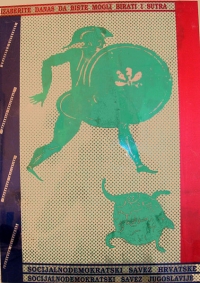
In "OA, OK?" Richard Gallagher (
2007) is quite right to say "we're still waiting" for the "optimal and inevitable" [Open Access]. I was already in full agreement in the previous millennium (
Harnad 1999):
"I have a feeling that when Posterity looks back at the last decade of the 2nd A.D. millennium of scholarly and scientific research on our planet, it may chuckle at us. It is not the pace of our scholarly and scientific research that will look risible, nor the tempo of technological change. On the contrary, the astonishing speed and scale of both will make the real anomaly look all the more striking.
"For staring us in the face in this last decade has been an obvious new way to augment that already impressive speed and scale by perhaps an order of magnitude, yet we simply haven't twigged on it...
"I don't think there is any doubt in anyone's mind as to what the optimal and inevitable outcome of all this will be: The Give-Away literature will be free at last online, in one global, interlinked virtual library... and its [peer-review] expenses will be paid for up-front, out of the [subscription cancellation] savings. The only question is: When? This piece is written in the hope of wiping the potential smirk off Posterity's face by persuading the academic cavalry, now that they have been led to the waters of self-archiving, that they should just go ahead and drink!" -- (Harnad 1999)
But Gallagher is not quite right that "most scientists became indifferent about Open Access." The syndrome is not quite indifference but a combination of ignorance and indolence (
Swan 2005) concerning what is already demonstrably in their own
best interests and fully
within their reach. I have dubbed the syndrome "
Zeno's Paralysis" (
Harnad 2006); the affliction is, fortunately, curable. The medicine is OA self-archiving
mandates (
Harnad 2001,
Harnad et al. 2003;
Harnad 2007) by researchers' institutions and funders.
And those
mandates are on the way. The inertia is and always was merely a matter of
keystrokes: getting those digits to deposit those digits. "
Publish or perish" mandates managed to induce otherwise busy, curiosity-driven researchers to find the time to set their (peer-reviewed) findings to paper, and self-archiving mandates will now ensure the few additional minutes it takes to make all published papers immediately and permanently accessible free for all their potential users online, rather than just for those whose institutions can afford subscription access to the journal in which they happen to be published (
Carr & Harnad 2005).
To close, a few loose ends:
(1) OA is not about journal affordability but about research accessibility.
(2) Harnad (1998) is available not because of "an online forum" but because it was self-archived in my institutional repository (without waiting for a mandate).
(3) The optimal/inevitable is not just overdue since 1998, but at least since 1994 (Harnad 1995, 2004; Poynder 2004), and actually at least a decade longer.
(4) OA self-archiving mandates have been mooted since at least 2001 (Harnad 2001, Harnad et al 2003).
(5) A more optimistic version of Esposito's (2007) "nautilus" was already mooted seventeen years ago, as "scholarly skywriting" (Harnad 1990).
References
Carr, L. and Harnad, S. (2005)
Keystroke Economy: A Study of the Time and Effort Involved in Self-Archiving. Technical Report, ECS, University of Southampton.
Esposito, J. (2007)
Open Access 2.0.
The Scientist 21(11) 52
Gallagher, R. (2007)
OA: OK? The Scientist 21(11) 13
Harnad, S. (1990)
Scholarly Skywriting and the Prepublication Continuum of Scientific Inquiry.
Psychological Science 1: 342 - 343 (reprinted in
Current Contents 45: 9-13, November 11 1991).
Harnad, S. (1995)
Universal FTP Archives for Esoteric Science and Scholarship: A Subversive Proposal. In: Ann Okerson & James O'Donnell (Eds.)
Scholarly Journals at the Crossroads; A Subversive Proposal for Electronic Publishing. Washington, DC., Association of Research Libraries, June 1995.
Harnad, S. (1998)
On-Line Journals and Financial Fire-Walls.
Nature 395 (6698): 127-128
Harnad, S. (1999)
Free at Last: The Future of Peer-Reviewed Journals.
D-Lib Magazine 5(12).
Harnad, Stevan (2001/2003/2004)
For Whom the Gate Tolls? Published as: (2003) Open Access to Peer-Reviewed Research Through Author/Institution Self-Archiving: Maximizing Research Impact by Maximizing Online Access. In: Law, Derek & Judith Andrews, Eds.
Digital Libraries: Policy Planning and Practice. Ashgate Publishing 2003. [Shorter version: Harnad S. (2003)
Journal of Postgraduate Medicine 49:
337-342.] and in: (2004)
Historical Social Research (HSR) 29:1. [French versions: Harnad, S. (2003)
Ciélographie et ciélolexie: Anomalie post-gutenbergienne et comment la résoudre. In: Origgi, G. & Arikha, N. (eds)
Le texte à l'heure de l'Internet. Bibliotheque Centre Pompidou:
Pp. 77-103. ]
Harnad, S. (2004) June 27 2004:
The 1994 "Subversive Proposal" at 10.
American Scientist Open Access Forum. June 27 2004.
Harnad, S. (2006)
Opening Access by Overcoming Zeno's Paralysis, in Jacobs, N., Eds.
Open Access: Key Strategic, Technical and Economic Aspects. Chandos.
Harnad, S. (2007)
The Green Road to Open Access: A Leveraged Transition. In: Anna Gacs.
The Culture of Periodicals from the Perspective of the Electronic Age. L'Harmattan. 99-106.
Harnad, S., Carr, L., Brody, T. and Oppenheim, C. (2003)
Mandated online RAE CVs Linked to University Eprint Archives.
Ariadne 35.
Poynder, R. (2004)
Ten Years After.
Information Today. October 2004
Swan, A. (2005)
Open access self-archiving: An Introduction.
JISC Technical Report.
Stevan Harnad
American Scientist Open Access Forum



